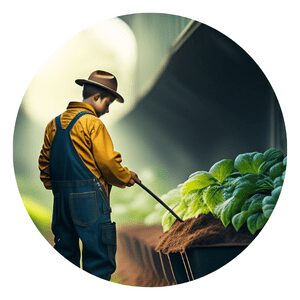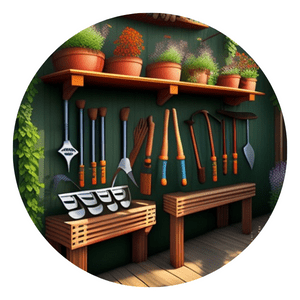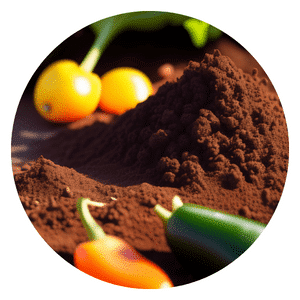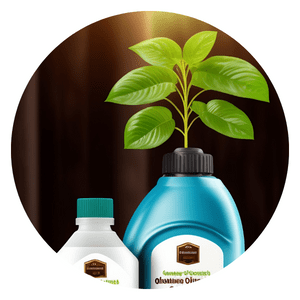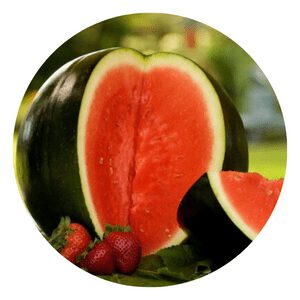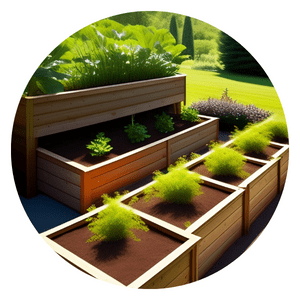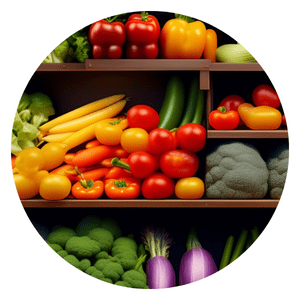How to Start Organic Vegetable Gardening
As the world becomes more conscious about the harmful effects of chemicals and pesticides in our food, many people are turning towards organic farming.
Growing your own organic vegetables can not only provide you with healthy and nutritious food but also contribute to a sustainable environment.
Starting an organic vegetable garden may seem intimidating, especially if you have no prior experience or knowledge.
However, with a little bit of planning and effort, it is a rewarding and enjoyable hobby that anyone can take up.
In this article, we will guide you through the essential steps on how to start your own organic vegetable garden at home.
Vegetables Garden Menu
Find a sunny spot
When starting an organic vegetable garden, finding the right spot for your plants is crucial.
Vegetables require a minimum of 6-8 hours of sunshine every day to grow properly. The sun is responsible for photosynthesis, which converts light energy into food for the plant.
Without enough sunlight, your vegetables will not be able to produce enough food and nutrients to grow healthy and strong. They may become stunted or weak and susceptible to pests and diseases.
Therefore, it’s important to find a sunny spot in your garden or yard that receives the necessary amount of sunlight each day.
If you don’t have a suitable location with ample sunlight available, consider using containers or raised beds that can be moved around as needed.
Additionally, you could try growing vegetables on a trellis or other structure that allows them to reach up towards the sun if your garden area receives partial shade during parts of the day.
With careful planning and consideration, you can ensure that your organic vegetable garden has all the sunshine it needs to thrive!
Prepare the soil
Once you have chosen the location for your organic vegetable garden, it’s time to prepare the soil.
Think of the soil as a cozy home for your plants, and just like any home, it needs to be clean and ready before new inhabitants move in. The first step is to remove any rocks or weeds from the area.
Rocks not only take up space but can also prevent roots from growing deep into the ground. Weeds compete with vegetables for nutrients and water.
The next step is to add compost to the soil. Compost acts like a nutritious meal for plants, providing them with all they need to grow healthy and strong.
You can make your own compost or purchase it from a local gardening center or farmer’s market.
Spread a layer of compost over the topsoil and mix it in well using a shovel or garden fork.
Finally, consider adding other amendments such as manure, bone meal, or rock phosphate depending on what you plan on growing in your garden.
These additives help improve soil fertility by providing essential plant nutrients such as nitrogen, phosphorus, potassium among others that are necessary for growth and development of plants.
By following these simple steps in preparing your garden beds,you’ll be creating an environment that will provide optimal conditions for plant growth which will lead to bountiful harvests come harvesting season!
Choose your favorite veggies
When it comes to starting an organic vegetable garden, choosing your favorite veggies is a great way to get started.
Not only will you be able to enjoy the fruits of your labor, but you’ll also be more likely to stay committed to maintaining your garden if you’re growing things that you love.
Some popular choices for veggie gardens include tomatoes, cucumbers, peppers, zucchini, and lettuce. These are all relatively easy to grow and can provide a steady supply of fresh produce throughout the season.
If you’re looking for something more unique or challenging, consider trying out some heirloom varieties or exotic vegetables like eggplant or okra.
Ultimately, the key to success with any vegetable garden is choosing plants that are well-suited for your climate and soil conditions, as well as being mindful of proper spacing and watering practices.
With a little bit of research and planning ahead of time, anyone can create a thriving organic vegetable garden filled with their favorite foods.
Start planting
Starting an organic vegetable garden is a great way to not only have fresh produce at your fingertips, but also to reduce your carbon footprint.
One of the first steps in starting a vegetable garden is to plant seeds or small plants.
If you’re starting from seeds, make sure you read the package instructions carefully and plant them at the appropriate depth.
If you have tiny seeds like magic beans, sow them directly into the soil after loosening it up with a small trowel or shovel.
Make sure they are spaced out properly so that they can grow without competing for resources.
Water them gently and frequently to ensure that they receive enough moisture.
For those who opt for quick results and purchase already grown plants, it’s important to transplant them gently into the garden.
Dig a hole deep enough for the roots without damaging them and place the plant inside securely, covering with soil up until its original planting depth.
Make sure you water thoroughly after transplanting to help with shock and settling in its new environment. With patience and care, both seedlings and transplants will thrive in your organic vegetable garden!
Give them a drink
One of the most important things to consider when starting an organic vegetables garden is watering.
Just like people, plants need water to survive and grow. However, it’s essential to be mindful of how much water you’re giving them.
Overwatering can lead to root rot, fungal diseases, and even death for your plants.
On the other hand, if you don’t provide enough water, your plants will become dehydrated and wilted.
To ensure that your plants receive adequate moisture without drowning them, it’s crucial to check the soil regularly.
Stick your finger about an inch deep into the soil; if it feels dry at this depth, then it’s time to water.
Additionally, ensure that there is proper drainage in your garden beds or containers so that excess water can drain away easily.
When watering your plants, aim for a gentle stream of water as opposed to a heavy deluge. This helps avoid soil erosion and ensures that water reaches all parts of the plant evenly.
Overall, keeping a watchful eye on watering habits goes a long way in maintaining happy and healthy organic vegetables!
Start your organic vegetables garden today, Seeds and soil is all you need to play. Choose your favorites, plant them with care, Watch them grow, flourish and share. Healthy food from your own creation, A sustainable way for generations.
Chappy The Gardener
Feed them with compost
Composting is an essential component of organic gardening. It involves decomposing organic matter, such as kitchen scraps and yard waste, into nutrient-rich soil that can feed your plants.
Compost provides essential nutrients to plants and helps keep the soil healthy by increasing its fertility.
To begin composting, you’ll need a compost bin or pile where you can layer your organic materials.
Some items to add include fruit and vegetable peels, eggshells, coffee grounds, grass clippings, leaves, and wood chips. Avoid adding meat or dairy products as they can attract pests.
As the materials break down over time through natural microbes and bacteria in the soil, it will turn into a rich dark brown substance called humus.
You can then use this compost as a top dressing for your garden beds or mix it with potting soil for container plants.
By feeding your plants with compost regularly, you’ll be providing them with all the necessary nutrients they need to thrive while also reducing waste in landfills.
So start composting today and watch your garden flourish!
Keep them cozy
One of the best ways to keep your organic vegetable garden thriving is by covering the soil with a soft blanket of straw or wood chips. This helps in keeping the soil warm and protecting it from weeds, which can otherwise harm your plants.
Not only does this method help in retaining moisture, but it also facilitates healthy growth of microorganisms that contribute to the fertility of your garden.
Straw and wood chips are readily available at garden centers and are affordable options for maintaining a healthy garden.
They work as an excellent mulch layer on top of the soil, which not only increases water retention but also regulates temperature fluctuations. In addition, they protect delicate seeds from weather conditions such as heavy rains or strong winds.
In conclusion, adding a soft blanket of straw or wood chips over your organic vegetable garden’s soil is an easy way to maintain its health and ensure proper growth.
So, go ahead and give it a try! Your plants will thank you for it!
Make friends with other plants
Another set of plants that work well together are tomatoes and basil.
Not only do they complement each other in dishes, but planting them next to each other will also benefit their growth.
Basil repels insects that can harm tomato plants, while tomatoes provide shade for the basil.
Additionally, marigolds make great companion plants for vegetables like beans, cucumbers, and squash.
The strong scent of marigolds deters pests such as nematodes and beetles from attacking these vegetables.
Marigolds also attract beneficial insects such as ladybugs and hoverflies.
Incorporating companion planting into your organic vegetable garden not only benefits the plants but also adds diversity to your garden.
By selecting compatible plant combinations, you can create a healthy growing environment for all your crops while minimizing the need for pesticides or chemicals.
Say no to pests
One of the biggest challenges of starting an organic vegetable garden is dealing with pests.
While it might be tempting to reach for chemical pesticides, it’s important to remember that these can harm beneficial insects and impact the overall health of your garden.
Instead, try natural pest control methods like inviting ladybugs to your garden.
Ladybugs are voracious eaters of aphids, whiteflies, and other common garden pests.
You can purchase them online or at a local nursery and release them into your garden in the evening when temperatures are cooler.
Another option is to plant flowers like marigolds, cosmos, and zinnias which attract ladybugs.
Along with inviting ladybugs to your garden, there are other natural ways you can keep pests at bay.
For example, using neem oil or garlic spray on plants can help repel insects without harming beneficial bugs.
Additionally, practicing good hygiene in the garden by removing dead leaves and weeds can reduce the likelihood of pest infestations.
By taking a proactive approach to pest control using natural methods like welcoming ladybugs into your space, you’ll be able to enjoy healthy plants without any negative environmental impacts.
Pull out the weeds
Once you’ve decided to start an organic vegetable garden, it’s important to keep up with the maintenance of your crops.
One of the most important things you can do for your garden is to pull out any weeds that may pop up in your beds.
Weeds are known for being invasive and they can quickly overtake a garden if left unchecked.
Pulling weeds by hand is one of the best ways to get rid of them.
It’s also one of the safest methods as it doesn’t involve using any chemicals or tools that could harm your plants.
When pulling weeds, make sure to grab them near their base and pull firmly but gently so as not to damage any nearby plants.
To prevent future weed growth, consider adding mulch around your plants. This will help retain moisture in the soil and prevent sunlight from reaching weed seeds, which will keep them from germinating.
Just be sure not to pile too much mulch on top of young seedlings as this could smother them and prevent proper growth.
With regular weeding and maintenance, you’ll have a thriving organic vegetable garden in no time!
Share the love
Bees and butterflies play a crucial role in pollinating plants, including vegetables, which is why it’s important to attract them to your garden.
One way to do this is by planting colorful flowers.
Not only will you be helping these beneficial insects thrive, but you’ll also get the added bonus of a beautiful garden.
When choosing flowers for your garden, look for varieties that bloom throughout the growing season. This will ensure that there are always plenty of nectar-rich blossoms available to attract bees and butterflies.
Some great options include coneflowers, bee balm, black-eyed susans, and milkweed.
By planting a variety of colorful flowers in your vegetable garden or nearby flower beds, you’ll create an environment that attracts pollinators all season long. These hardworking insects will help ensure a bountiful harvest of delicious organic vegetables come harvest time.
So go ahead – share the love with bees and butterflies by planting colorful flowers!
Harvest time
Harvest time is an exciting moment for any gardener.
After all the hard work of planting and tending to the garden, it’s finally time to reap the rewards.
The key to a successful harvest is knowing when your vegetables are fully ripe and ready to be picked.
Start by checking your plants regularly, looking for signs that they’re ready to be harvested. This might include changes in color or size, or simply a sense that they’re no longer growing.
When you do pick your veggies, use gentle pressure and care not to damage the plant itself.
Once you’ve harvested your vegetables, it’s important to store them properly so that they stay fresh as long as possible. This might mean wrapping them in damp paper towels or storing them in plastic bags with holes punched in them for ventilation.
With proper care, you can enjoy the fruits (and veggies) of your labor all season long!
Explore organic fertilizers
Organic fertilizers are a great way to nourish your vegetable garden without exposing it to harmful chemicals.
Compost, for example, is an all-purpose fertilizer that provides plants with the essential nutrients they need to grow strong and healthy. It also enhances soil structure, improves drainage, and helps retain moisture.
Worm poop may not sound very appealing, but it’s actually one of the best natural fertilizers you can use.
Worm castings contain high levels of nitrogen, phosphorus, potassium, calcium and magnesium – all essential minerals that your plants need. They also improve soil health by increasing microbial activity and enhancing nutrient uptake.
Seaweed juice is another excellent organic fertilizer option that provides plants with a range of essential nutrients like zinc, iron and potassium.
It also contains cytokinins which promote cell division in plant tissue leading to increased growth rates.
Additionally seaweed juice stimulates beneficial bacteria in soil leading to improved nutrient uptake by plant roots making them less susceptible to diseases or pests attack.
Rotate your crops
Rotating your crops is an essential aspect of organic vegetable gardening.
It involves moving plants around each year to different parts of the garden. This technique ensures that the soil remains healthy and fertile, and it also prevents pests and diseases from taking root in one specific area.
When you rotate your crops, you can increase soil nutrients, reduce pest pressure, and minimize disease problems.
By rotating where you plant your vegetables every season, you prevent the same crop from depleting the same nutrients in a particular spot in the garden.
Moreover, this practice helps control pests by breaking their life cycle – they may not be able to find their host plant if it’s no longer present in that area.
Crop rotation has been practiced for thousands of years with proven benefits.
Not only does this method help maintain soil fertility and health but also creates happier plants that produce more bountiful harvests.
So before planting another season of vegetables or fruits in your garden bed, consider moving them around like musical chairs – it might just be what your plants need for a successful yield!
Watch out for plant doctors
Plants, just like humans, can fall ill. They may have yellowing leaves or wilting stems, and it’s up to us to fix the problem.
However, before we reach for synthetic chemicals that may harm our environment, try natural remedies instead.
For example, coffee grounds are an excellent fertilizer that adds nutrients to the soil and repels pests.
Keep in mind that plants require different care based on their species; what works for one plant might not work for another.
So if you notice your tomato plant is struggling, don’t assume the same solution will help your cucumber plant too.
Observe each of your plants carefully and research their specific needs.
As a gardener, it’s essential to be vigilant about our plant’s health and take timely action when we spot any issues.
Utilizing natural remedies will keep our garden organic while minimizing damage to plants and the environment alike.
Learn from nature
Observing how plants grow in the wild can be a great way to start an organic vegetable garden.
For example, instead of using synthetic fertilizers and pesticides, you can use natural compost and companion planting techniques to create a healthy ecosystem for your plants.
Mimicking nature’s ways means allowing plants to grow at their own pace without interference.
Nature teaches us that diversity is important for the survival of any ecosystem.
In an organic vegetable garden, this means growing a variety of vegetables and herbs together rather than monoculture farming. This promotes biodiversity and helps control pests naturally by attracting beneficial insects.
Additionally, observing how plants adapt to their environment can teach us about sustainability.
Plants in the wild have evolved over time to thrive in their specific habitat without human intervention. By mimicking these adaptations in our gardens, we can create sustainable ecosystems that are self-sufficient and require less maintenance over time.
Overall, learning from nature is an essential step towards creating a successful organic vegetable garden that is not only productive but also environmentally friendly.
Celebrate with a garden feast
Once your organic vegetable garden has flourished, it’s time to reap the benefits and enjoy a delicious feast made from your own produce.
Harvesting fresh vegetables is an incredibly satisfying experience that will not only reward you with amazing flavors but also add a sense of accomplishment to your gardening journey.
Whether you’re grilling some eggplant, roasting some sweet potatoes, or tossing up a salad with freshly picked greens, you’ll taste the difference in every bite.
Every vegetable that comes straight from your garden is packed with nutrients and flavor because it was grown without harmful chemicals and pesticides.
So invite friends over for a garden party or simply enjoy a meal under the sun in your backyard.
There’s no need to worry about where the vegetables came from because they’re right at home in your own garden. Celebrate all of your hard work by savoring every bite of fresh produce straight from nature’s bounty.
Stay curious and keep learning
Once you start your organic vegetable garden, it’s important to stay curious and keep learning about gardening.
Gardening is a never-ending adventure that can teach you new things every day.
Keeping an inquisitive mind will help you to understand the needs of plants and how they react to different circumstances.
Asking questions is a great way to learn more about gardening. You could ask fellow gardeners or experts at your local nursery for advice on how to care for certain plants or deal with pests and diseases.
Reading books can also provide valuable insight into various aspects of gardening, such as soil health, companion planting, and crop rotation.
In addition, discovering new things about plants and nature can spark creativity and innovation in your approach to gardening.
Trying out new methods or experimenting with different plant varieties can lead to unexpected successes and failures that offer valuable lessons for future growth.
Ultimately, staying curious and keeping an open mind will help you become a better gardener while deepening your appreciation for the natural world around us.
Share your harvest
One of the most satisfying things about growing your own organic vegetable garden is the bountiful harvest you get at the end.
While you can certainly enjoy all the fresh produce yourself, sharing it with others is a great way to spread joy and build community.
Whether it’s inviting friends over for a big feast or simply gifting some veggies to neighbors and coworkers, sharing your harvest is a wonderful gesture that will make everyone feel good.
In addition to spreading happiness, sharing your harvest also helps reduce food waste.
Instead of letting excess produce rot or go unused, giving it away ensures that all your hard work doesn’t go to waste.
Plus, if you have more than enough vegetables for yourself, why not share the wealth? Your loved ones will appreciate the fresh, healthy food and may even be inspired to start their own organic garden.
Overall, there are so many benefits to sharing your bountiful harvest with others.
From building connections in your community to reducing food waste and promoting healthy eating habits, this simple act of generosity can have a big impact on everyone involved.
So next time you’re harvesting from your organic vegetable garden, consider who else could benefit from all that goodness!
Grow with love
Starting an organic vegetable garden is a great way to enjoy fresh produce while reducing your carbon footprint.
But plants require more than just water and sunlight to thrive – they also need love and care.
Remember that plants can feel your energy, so it’s important to treat them gently and with kindness.
One way to show your love for your plants is by giving them the attention they deserve.
Take the time to inspect each plant regularly for signs of disease or pest infestation, and remove any damaged leaves or stems promptly. Providing a healthy environment with plenty of nutrients in the soil will also help your vegetables grow strong and healthy.
Another way to show your love for your plants is by talking to them!
Plants have been shown to respond positively when spoken to, so don’t be afraid to give some positive affirmati
ons as you tend to your garden. With patience, persistence, and love, you’ll soon see the fruits (and vegetables) of all of your hard work!
In conclusion, starting an organic vegetable garden is a rewarding experience that benefits both the environment and your health.
It may seem daunting at first, but with proper planning and execution, anyone can successfully grow their own produce.
By avoiding harmful chemicals and pesticides, you’ll not only reduce your carbon footprint but also enjoy fresh, nutritious vegetables straight from your backyard. So why not give it a try?
Start small and gradually build up your garden to suit your needs.
With a little effort and patience, you’ll soon be reaping the delicious rewards of your organic vegetable garden.
Click To Grow
Helps Us Grow – Share If You Like


